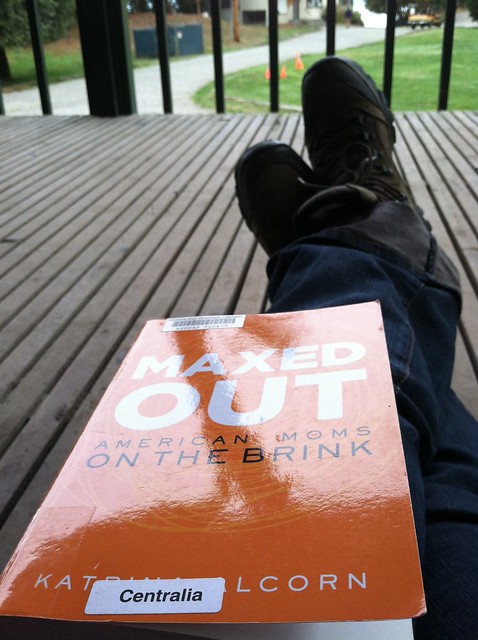
I took this book to the middle school Con (conference/weekend at camp) that I chaperoned last weekend: Maxed Out: American Moms on the Brink by Katrina Alcorn. The title of the book on my lap started some conversation among the parent chaperones taking a brief break on the porch of the dining hall (2 other moms and a dad). Why do we feel so maxed out? What forces push us into pushing ourselves to the brink?
I noted that often it seems to be a sense of competiveness that does me in - I simply have a hard time seeing anyone else do something (anything) without an inward thought of "I should be able to do that too". The mom who is also incredibly fit and athletic? I should be able to do that too. The other mom who does lots of volunteer work? I should be able to do that too (along with the fitness, this is additive and I don't give up the old goals as I pile on the new ones). Clearly, this is unsustainable!
Another mom noted that she doesn't feel competitive, but rather overwhelmed with all the possibilities. There were so many options available in life, and it made it hard to choose just enough without ending up with too much to do. The other mom disagreed with both of us and noted that for her it was that there were just a lot of obligations and not really anyone else to do them. Kids have to be picked up if there is no bus, family members have to be cared for, chores have to be done, money has to be earned and managed.
In a somewhat stereotypical turn of events, the dad in the conversation didn't really relate to these notions of pressure that we moms were talking about. I'm sure many dads do feel maxed out, but at least in the circle I talk to it seems to be based on actual external events far more than it is for us moms. We seem to be doing it to ourselves in addition to taking on the external realities.
The author of this book is the creator of the blog "Working Moms Break" which I've been reading for some years now. The blog talks a lot about the realities of balancing work with motherhood and on trying to make American work-culture more family-friendly. The book is much more of a personal story, though, with only short side-bar conversations about the big picture of what is happening for other parents and how American parenting and working compares to other parts of the world. And, as a personal memoir, of course the issue for the reader becomes how much you can relate to the point of view of the author.
Just as I found when I read Sheryl Sandberg's Lean In, I could relate to some aspects of Alcorn's tale but not to others. It would be easy to pick apart this story and call the author out with phrases like "just suck it up" or "plenty of people have it worse than you, so stop complaining". But that's not the point at all - this is her life and I really can't judge another person and how they feel. Alcorn was driven to panic attacks and illness by her efforts to be a working mother and had to step back for the sake of her own sanity, basically. I have been there too, feeling like I was drowning and just desperately needing a way out. I have struggled with the constant back and forth of "maybe I should just quit my job" when the juggling act gets too frenetic or exhausting.
Ultimately, Alcorn's story doesn't give me any answers for my own situation, anymore than Sandberg's did. Whether I respond to the pressures by leaning in or by admitting that I'm maxed out, I think the real issue is not whether I measure my life against another woman's but whether I can STOP DOING THAT. It's their life, and this is my life.
I'm sometimes Maxed Out because I try to be Everything to Everyone and because society is only too happy to let me do that. I'm also maxed out because there are real barriers out there (sexism, opportunity costs, or as the narrator of a nature documentary I watched as child noted "it is harder for the female members of the group to keep up while also carrying the young") I can Lean In and push harder against the barriers, but here's another truth I have learned in my life - at some point will and desire are not enough. At some point the sacrifice of yourself and your health are too much.
We need to keep talking about this, and the personal narrative has its place in the conversation. Alcorn's is a perfectly decent addition to that part of the discussion: well-written, representative of a slice of the population, and trying for some objectivity. It could be a great spur to conversation, such as the one I had on the porch. If nothing else, bringing the pressures out and talking about them takes away some of the sting.

No comments:
Post a Comment